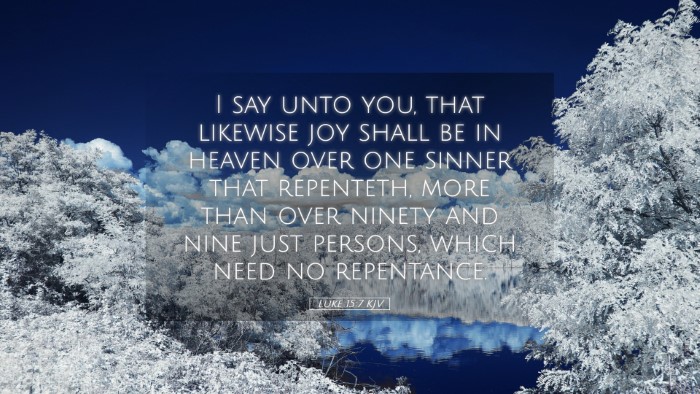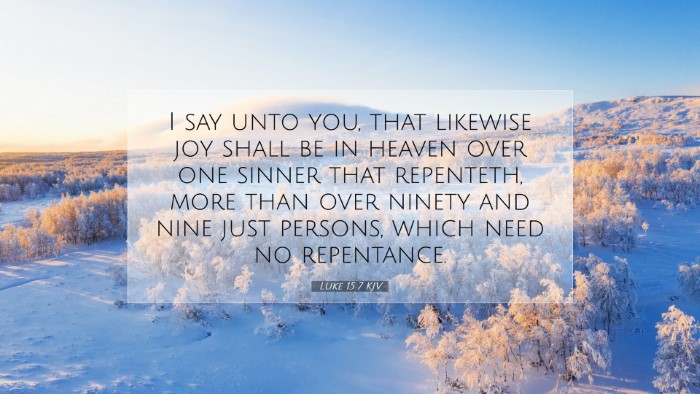Commentary on Luke 15:7
Verse Text: "I tell you that in the same way there will be more rejoicing in heaven over one sinner who repents than over ninety-nine righteous persons who do not need to repent." (Luke 15:7, NIV)
Introduction
This verse is a profound statement concerning the nature of God's grace and the joy of redemption. Within the context of the parables of the lost sheep, the lost coin, and the prodigal son, Jesus emphasizes the value that God places on each individual, particularly the sinner who repents. This commentary will explore the theological implications and pastoral applications of this verse, drawing from esteemed public domain commentaries.
The Context of Luke 15
The backdrop of Luke 15 is essential to understand the significance of Jesus' message. The chapter begins with the Pharisees and scribes grumbling about Jesus' association with sinners (Luke 15:1-2). In response, Jesus tells three parables that illustrate God's love for the lost and the joy of their recovery.
Parable of the Lost Sheep (Luke 15:3-7)
This parable illustrates the shepherd's care for each sheep, emphasizing that the joy of finding one lost soul surpasses the status quo of the ninety-nine. As Matthew Henry observes, "This parable teaches us about the compassion of Christ and his concern for each individual." The shepherd, representing Christ, does not merely count the sheep but seeks the one that is lost, displaying God's personal investment in every sinner.
Theological Insights
Rejoicing in Heaven
Albert Barnes notes that the joy in heaven reflects the heart of God, who desires for all to come to repentance. The verse illustrates a divine perspective on human affairs—heaven celebrates every single act of repentance. This viewpoint challenges the conventional understanding that divine joy might be reserved for larger masses or general obedience. Instead, it affirms God's intimate and personal relationship with humanity.
The Value of One
The phrase "more rejoicing in heaven" highlights the immense value placed on one repentant sinner. Adam Clarke emphasizes that no soul is too insignificant for God’s attention. The focus here is not on the majority's righteousness but on the individual who turns from sin. This individual, though lost among many, holds immense worth. Clarke states, "In the eyes of God, one repentant sinner can outshine the righteousness of the multitude." This perspective serves as a counter-narrative to societal views of worth and success.
Pastoral Applications
The Call to Seek the Lost
This verse serves as a powerful reminder to pastors and church leaders to prioritize outreach and evangelism. The example of the shepherd is a call to actively seek those who are lost. Matthew Henry encourages believers to mirror this divine pursuit through a personal commitment to reach out to those in need of grace. The shepherd's search illustrates the need for a proactive approach to ministry, recognizing that each person matters to God.
Encouragement for the Repentant
For the repentant sinner, this verse offers profound encouragement. The assurance that heaven rejoices over one's return highlights the depth of God's grace. As noted by Albert Barnes, "No matter how far one has strayed, returning to God results in a jubilant welcome." This can be especially transformative for those burdened by guilt or shame, reassuring them of their worth in God’s sight.
Conclusion
Luke 15:7 encapsulates the heart of the Gospel, emphasizing God’s profound love and joy for each sinner who repents. Through the insights from public domain commentaries, we understand that the value of an individual’s repentance exceeds our human calculations. As religious leaders, students, or scholars, it is essential to embrace this principle, champion the call to evangelism, and celebrate the transformative power of God’s grace.
Further Reflection Questions
- In what ways can we actively seek the lost within our communities?
- How does the joy of repentance shape our understanding of God’s love?
- What practical steps can be taken to create a welcoming environment for those who wish to repent?
- How can the church reflect the joy of heaven in its mission and outreach efforts?


